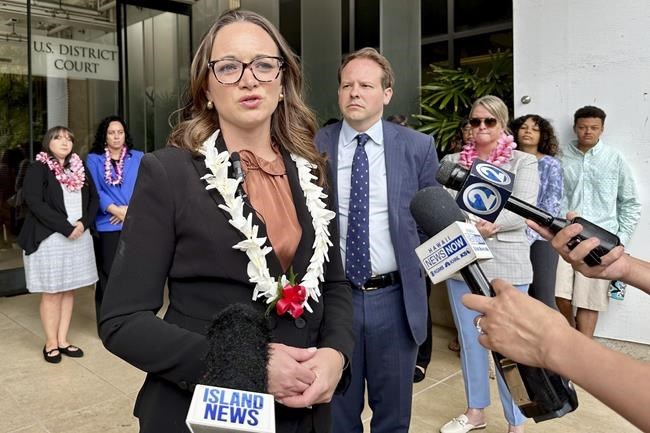
Attorney Kristina Baehr speaks to reporters outside federal court on Monday, May 13, 2024, in Honolulu. Baehr represents U.S. military families suing the United States over a 2021 jet fuel leak into a Navy water system in Hawaii that sickened thousands of people. (AP Photo/Jennifer Kelleher)
Republished May 13, 2024 - 5:55 PM
Original Publication Date May 13, 2024 - 4:51 PM
HONOLULU (AP) — A lawyer representing U.S. military families suing over a 2021 jet fuel leak into a Navy drinking water system in Hawaii asked a judge Monday to award plaintiffs a range of about $225,000 to about $1.25 million each in damages.
In a closing argument at the end of a two-week trial in federal court in Honolulu, the plaintiffs' attorney, Kristina Baehr, said she is not asking for millions of dollars per person. She outlined various amounts they're asking a judge to award each of them, including $400,000 for the past pain and suffering of Nastasia Freeman, wife of a Navy sailor and mother of three who described how the family thought their vomiting and diarrhea was Thanksgiving food poisoning.
Baehr said Freeman should also get $200,000 for future pain and suffering, $250,000 for mental anguish, $100,000 for impairment, $150,000 for loss of enjoyment of life, $93,000 for lost wages and $57,000 for therapy.
Freeman is at the high end of the requested amounts because the water contamination reactivated a seizure disorder that had been dormant, Baehr said.
Freeman is among the 17 “bellwether” plaintiffs: a cross-selection of relatives of military members representing more than 7,500 others, including service members, in three federal lawsuits.
The outcome can help determine future damages to be awarded or settlements for the others.
Baehr thanked attorneys representing the United States for admitting liability in the case. The government has said in court documents that the Nov. 20, 2021, spill at the Red Hill Bulk Fuel Storage Facility caused a nuisance for the plaintiffs, that the United States “breached its duty of care” and that the plaintiffs suffered compensable injuries.
But government attorneys dispute whether the residents were exposed to jet fuel at levels high enough to cause their alleged health effects, ranging from vomiting to rashes.
The plaintiffs described how the water crisis sickened them and left them with ongoing health problems, including seizures, asthma, eczema and vestibular dysfunction.
Eric Rey, a U.S. Department of Justice attorney, said in his closing statement that one of the families didn't stop drinking the water until Dec. 9, even though the Navy first received complaints about the water on Nov. 27. That's likely because they didn't smell anything in the water before then, an indication the doses of jet fuel in the water were too low to cause their health effects, he said.
“There is no acceptable level of jet fuel in drinking water," Baehr said. “We don’t expect to have jet fuel in our drinking water.”
A Navy investigation report in 2022 listed a cascading series of mistakes from May 6, 2021, when an operator error caused a pipe to rupture that led to 21,000 gallons (80,000 liters) of fuel spilling while it was transferred between tanks. Most of this fuel spilled into a fire suppression line and sat there for six months, causing the line to sag. When a cart rammed into this sagging line on Nov. 20, it released 20,000 gallons (75,700 liters) of fuel.
The military eventually agreed to drain the tanks, amid state orders and protests from Native Hawaiians and other Hawaii residents concerned about the threat posed to Honolulu’s water supply. The tanks sit above an aquifer supplying water to 400,000 people in urban Honolulu.
It's not clear when U.S. District Judge Leslie Kobayashi will issue a ruling. Attorneys on both sides have until around July to submit additional closing briefs and respond to them.
“I appreciate what you've gone through," Kobayashi told the plaintiffs in court Monday. “I hope at some point that wherever the decision lands that it gives you a sense that you've had your opportunity to speak your mind and represent your families.”
__
This version corrects that the requested amount for Freeman's future pain and suffering is $200,000, not $400,000.
News from © The Associated Press, 2024